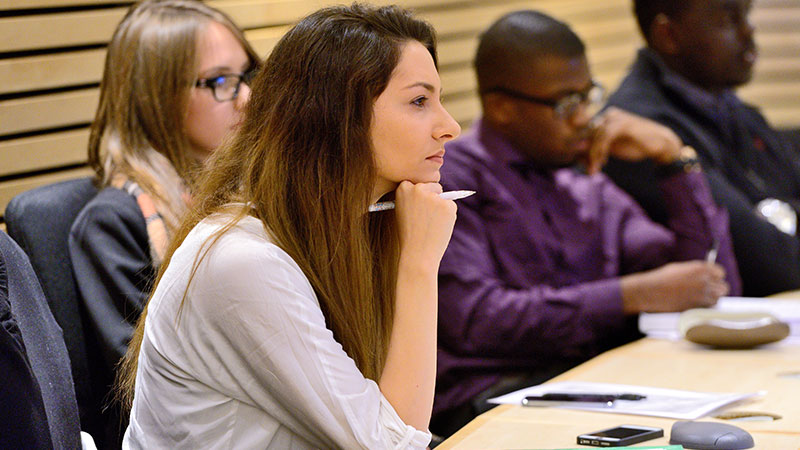Start dates: September 2026
Full time: 1 year or 2 years in sandwich mode which includes one year's full-time paid supervised work experience (a work placement). Sandwich mode is only available for September entry.
Part time: MSc: 24 months for UK students only
Location: Headington
School(s): Oxford Brookes Business School
Overview
Are you keen to lead a profit-driven enterprise or make a difference in the not-for-profit sector? Our industry accredited MSc Management is tailor-made for students like you. During your studies you'll grasp the foundations of how businesses operate, while developing your skills in cross-cultural management. You'll unleash your potential in the world of management.
Our aim is to equip you with the knowledge and abilities to thrive in various management roles. We understand today's fast moving workplace, where 'soft skills' in management have gained importance. You'll develop your self-awareness and competencies to lead and manage people within cross-cultural contexts. Also we can help you prepare for further study if you choose that path.
So take this opportunity to build your management skills, and develop insight into cross-cultural workplaces. You’ll finish the course ready to take your first managerial step into the corporate world.

Why Oxford Brookes University?
-
Experiential learning
Apply your learning to practice. We also run an optional study trip so you can see how businesses operate on a global scale. We’ve visited Boston, Budapest and Chengdu.
-
A diverse community with expertise
A community with 56 nationalities across the MSc portfolio. Seeing the world from new perspectives will shape your decision-making as you move into management positions.
-
Build your network
You’ll make new connections at networking events, guest lectures, business societies and through the Brookes Buddying network.
-
Co-curricular events
Team up with students from across a range of disciplines to work on a problem being faced by real companies for Business Challenge Week.
Course details
Study modules
Be industry ready when you graduate
By undertaking an optional work placement you can gain valuable and relevant industry experience and develop transferable skills such as communication, teamwork, networking and problem solving. A work placement can help you decide on your long-term career objectives and may lead to a job offer after graduation (would require visa sponsorship for international students).
The WAVES (Work and Voluntary Experience Service) or Careers Office will provide you with support and advice to get ahead in your career, and help you with your CV and applications. The team has access to a wide range of small, medium and large employers that offer postgraduate student work placements.
If you wish to pursue a placement at a particular company, our WAVES team can support you in making an approach to the company. Our Careers Office can also provide you with advice on how to use professional social media channels to pitch yourself to prospective employers.
Please note: As our courses are reviewed regularly as part of our quality assurance framework, the modules you can choose from may vary from those shown here. The structure of the course may also mean some modules are not available to you.
Research
Studying for your MSc Management degree at Oxford Brookes Business School also offers you the opportunity to engage with our excellent research. Our academics investigate core challenges facing contemporary societies, ranging from refugee entrepreneurship and internationalisation to sustainable tourism, security and the changing world of work and organisations - including the impact of artificial intelligence.
We address questions such as:
- How can social media address well-being and social isolation?
- How can individuals be happier and how to navigate the increasingly complex world of work?
- How can technologies be used to map movements, reduce congestion and improve the quality of life?
And many others! Please visit our research pages to learn more.
Being a Masters student at OBBS offers plenty of opportunities to be a part of our research culture and to discuss your own research ideas with one of our academics.

Careers
By the end of this Chartered Management Institute (CMI) accredited course, you’ll be ready for a range of careers. Our alumni have forged successful paths with prestigious commercial powerhouses and inspiring not-for-profit organizations across the globe. Others join management consultancies or go on to study for a PhD.
A few examples of graduate roles include:
- business change manager at DSV - Global Transport and Logistics
- finance business controller at Informa
- managing director at Miyabi Consulting Group
- account director at Revere Agency
- senior consultant at Amadeus FiRe AG.
You’ll also find our past students working at big names including:
- PricewaterhouseCoopers
- Oxfam
- Sainsbury's
- Nestlé
- Unilever.
We work closely with Brookes Enterprise Support and their suite of start-up leadership workshops and mentoring. There are plenty of opportunities for networking throughout the course, so you may even find a future employer before you graduate.
Student profiles
Our Staff
Tom Elsworth
With his 35 years of experience, Tom has worked for multi-million-pound companies, acting as Head of Employee Relations, Head of Public Relations as well as Directorships of SMEs. Tom shares his knowledge as a senior lecturer in the Business School.
Read more about TomRelated courses
Entry requirements
Specific entry requirements
A minimum of a second class honours degree (2:2) in any academic discipline, or equivalent overseas degree from a recognised institution or equivalent professional or other qualification.
Applicants who possess a diploma rather than a good degree may be eligible for entry provided they have compensatory work experience and can demonstrate career development.
This course attracts students from a wide range of backgrounds and nationalities. Applications are welcome from those in work and seeking continuing professional development.
Entry will also be subject to one satisfactory reference (academic).
Please also see the University's general entry requirements.
English language requirements
If English is not your first language you will need to satisfy the university's English language requirements:
- IELTS minimum 6.0 (with a minimum of 6.0 in reading and writing and 5.5 in listening and speaking)
- if you have completed your undergraduate degree in the UK (at least one full year of study) you will automatically meet our English language requirements
Please also see the University's standard English language requirements.
Pathways courses for international and EU students
We offer a range of courses to help you meet the entry requirements for your postgraduate course and also familiarise you with university life in the UK.
Take a Pre-Master's course to develop your subject knowledge, study skills and academic language level in preparation for your master's course.
If you need to improve your English language, we offer pre-sessional English language courses to help you meet the English language requirements of your chosen master’s course.
English requirements for visas
If you need a student visa to enter the UK you will need to meet the UK Visas and Immigration minimum language requirements as well as the University's requirements. Find out more about English language requirements.
Terms and conditions of enrolment
When you accept our offer, you agree to the Terms and Conditions of Enrolment. You should therefore read those conditions before accepting the offer.
International qualifications and equivalences
How to apply
Application process
Tuition fees
Questions about fees?
Contact Student Finance on:
Tuition fees
The full-time fees quoted are for the taught Year 1. Fees will be charged for the placement year in Year 2 and are available on request from finance-fees@brookes.ac.uk.
The following factors will be taken into account by the University when it is setting the annual fees: inflationary measures such as the retail price indices, projected increases in University costs, changes in the level of funding received from Government sources, admissions statistics and access considerations including the availability of student support.
How and when to pay
Tuition fee instalments for the semester are due by the Monday of week 1 of each semester. Students are not liable for full fees for that semester if they leave before week 4. If the leaving date is after week 4, full fees for the semester are payable.
- For information on payment methods please see our Make a Payment page.
- For information about refunds please visit our Refund policy page
Additional costs
Please be aware that some courses will involve some additional costs that are not covered by your fees. Specific additional costs for this course are detailed below.
We offer a non credit-bearing International Study Trip which is available to all postgraduate Business School students.
The International Study Trip modules allow you to experience ideas and practices of global business. During the trip you will have direct interaction with management executives and practices. You will attend presentations from local management executives and experts and go on site visits to major corporations and agencies. These study trips are voluntary and you will need to fund most of the costs associated with the trip. We have run study trips to Boston, Chengdu, Kuala Lumpur and Budapest.
As an example of costs, the fees in 2022 and 2023 were around £2000 per student and included: accommodation for seven nights, insurance, company visits and group transportation for all activities. This fee did not include international airfare, visa application fee (if relevant), dinners and activities during your free time.
Optional costs
| Additional costs | Amount (£) |
|---|---|
It’s your responsibility to cover print / binding costs where coursework submission is required. Please note that a lot of the coursework is now submitted online. |
From £30 |
| You may choose to purchase books to support your studies. Many books on our reading lists are available via the Library, or can be purchased secondhand. | £20-60 per book |
Accommodation fees in Brookes Letting (most do not include bills) |
£107-301 per week |
Accommodation fees in university halls (bills included, excluding laundry costs) |
£139-248 per week |
| CMI student membership | £330 |
Graduation costs include tickets, gowning and photography. Gowns are not compulsory but typically students do hire robes, starting at £41. |
Typically £0-200 |
International Business in Practice Study Trip module (inc. accommodation for seven nights, insurance, company visits and group transportation for all activities). This fee did not include international airfare, visa application fee (if relevant), dinners and activities during your free time. |
£2250-2500 |
Students are responsible for their own travel to and from university for classes. For the 2025/26 academic year, the University is introducing an alternative subsidised travel offer for all students with further information on our Travel webpages. |
From £10 |
Funding your studies
Financial support and scholarships
Featured funding opportunities available for this course.
All financial support and scholarships
Programme changes:
On rare occasions we may need to make changes to our course programmes after they have been
published on the website. For more information, please visit our
changes to programmes page.


